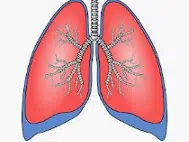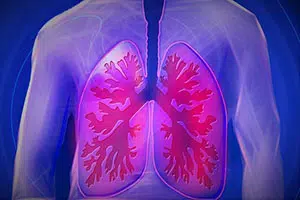 The pleurae are the membranes that line the lungs and the walls of the thoracic cavity in mammals. The pulmonary pleura is the sector that is attached to each lung, while the costal pleura is the part that lines the walls of the thoracic cavity.
The pleurae are the membranes that line the lungs and the walls of the thoracic cavity in mammals. The pulmonary pleura is the sector that is attached to each lung, while the costal pleura is the part that lines the walls of the thoracic cavity.
It can be said that the pleura covers the outside of the lungs and the inside of the rib cage . In this sense, the visceral pleura is the one located next to the lungs, the parietal pleura being the one that is in contact with the thorax.
The space between the visceral pleura and the parietal pleura is called the pleural cavity . This region has a reduced amount of liquid that helps the membranes slide smoothly during inhalation and exhalation.
The function of the pleura, in fact, is to enable the correct movement of the lung during respiration . Various disorders can affect the pleura and, consequently, make breathing difficult.
Excessive fluid buildup in the pleura is called pleural effusion . When blood accumulates it is called hemothorax , while the presence of air in the pleura is called pneumothorax .
Another condition of the pleura is pleurisy . In this case, the membrane becomes inflamed and causes severe pain when breathing.
Pleurisy causes the pleurae to become inflamed. When so-called pleuritis occurs, the patient experiences sharp pain in the chest area, which becomes worse every time they breathe. As mentioned above, in a healthy body these membranes are separated by a fluid found in the so-called pleural cavity , and can slide smoothly during the expansion and contraction of the lungs when breathing.
In a case of pleurisy, the pleurae become inflamed and swollen, so that when moving they rub violently, which is why such intense pain arises with breathing. In fact, just holding your breath can give the patient momentary relief.
 Chest pain is not only experienced when breathing, but of course when sneezing or coughing. Other symptoms include a feeling of suffocation (which occurs as a result of trying to breathe as little as possible to avoid discomfort), cough, and fever. These last two are the least common.
Chest pain is not only experienced when breathing, but of course when sneezing or coughing. Other symptoms include a feeling of suffocation (which occurs as a result of trying to breathe as little as possible to avoid discomfort), cough, and fever. These last two are the least common.
By moving the upper part of the body we can cause the pain of pleurisy to spread to the back or shoulders. Three disorders in particular can accompany pleurisy. The first of them is the aforementioned pleural effusion . On the other hand, there is atelectasis , the partial or total collapse of the lung due to excess fluid caused by the effusion ; Its consequences are cough and difficulty breathing.
Empyema , for its part, is the infection and accumulation of pus that can also occur due to pleural effusion. One of its most common symptoms is fever.
Among the most frequent causes of this inflammation of the pleura we can point out: viral infections (such as the flu), bacterial (pneumonia) or fungal infections; autoimmune disorders (lupus or rheumatoid arthritis); lung cancer close to the surface of the pleura; pulmonary embolism; tuberculosis; trauma to the ribs; sickle cell anemia; certain medications.
Although different complications can cause pleural problems, infections caused by a virus are the most common. However, chest injury , tuberculosis , and chronic obstructive pulmonary disease ( COPD ) can also cause problems with the pleura.
